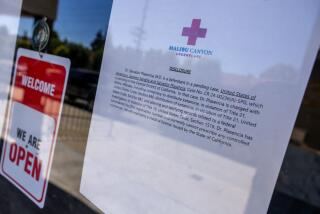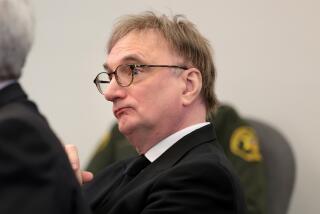‘Death Doctor’ Barred From Aiding Suicides
- Share via
PONTIAC, Mich. — The self-described “doctor of death” who helped a woman suffering from Alzheimer’s disease to commit suicide this week was barred by court order from further assisting in suicides after a bizarre hearing Friday in which he defended his “death machine” and warned that prohibiting its use would plunge society back into the “Dark Ages.”
Dr. Jack Kevorkian, a 62-year-old retired pathologist from Royal Oak, Mich., who helped Janet Adkins, a Portland, Ore., woman kill herself with a lethal injection from his device, said he will abide by the order issued by Oakland County Circuit Judge Alice Gilbert and will no longer attempt to help others kill themselves.
“I’m out of business,” Kevorkian told reporters.
Adkins was the only person to use Kevorkian’s suicide machine, which has been impounded by the police.
Kevorkian, a thin, graying bachelor who has been ostracized by the mainstream medical community and who prosecutors contend “revels in his role as outcast,” said he was not surprised by the court injunction banning his work.
He said he expected it because “we are a sniveling, weak, philosophically paralyzed society, and everybody knows it.”
Kevorkian, who acted as his own lawyer, added: “Yes, I’m angry, I’m angry at the (medical) profession and I’m angry at society.”
In court, he compared his plight to that of the fictional Dr. Frankenstein, who, he said, also was misunderstood. “The medical profession is stuck in the Dark Ages. I’m sure if they could burn me at the stake, they would.”
Kevorkian, testifying along with his sister, Flora, who assisted him during Adkins’ death last Monday, described in detail at the hearing the days leading up to the death, providing the first full account of the background to the suicide.
He said that he repeatedly offered the 54-year-old Adkins a chance to back out but that she was eager to kill herself and end her suffering before her health failed completely. He noted that she seemed frightened and saddened each time he suggested delaying or putting off the suicide.
Kevorkian said that her last words as she lay dying in the back of his rusted 1968 Volkswagen van, with intravenous lines plugged into her right arm, were: “Thank you, thank you.”
His only reply to her was: “Have a nice trip.”
Meanwhile, Kevorkian’s sister read the Lord’s Prayer to Adkins as she lay in the van, attached to the death device.
The machine, which he said he made from parts purchased at “flea markets and garage sales,” is essentially a series of intravenous lines leading to vials of pain-killing and lethal drugs, which begin to flow after the victim pushes a button. Kevorkian said that Adkins pushed the button three times just to make sure that the drugs would kick in.
For several minutes, Kevorkian then sat watching an electrocardiogram he had attached to monitor Adkins’ heart, waited until a “flat line” showed signs of death, and then left to call the police. His sister stood vigil outside the van, its back door partly closed, until he returned.
When asked by Oakland County Assistant Prosecutor Michael Modelski whether he had felt “excited” during Adkins’ death, Kevorkian said instead that he felt “self-satisfied” that he had been successful in his first attempt to assist in a suicide.
Kevorkian acknowledged that, while he was preparing his machine at the Groveland Oaks County Park last Monday for Adkins’ use, he spilled some drugs in the back of his van and was forced to return with Adkins to his home to get more, delaying the suicide by several hours.
In addition, he testified that he never spoke to Janet Adkins until the weekend before her death, after she and her husband, along with her closest friend, flew to Michigan from Oregon on June 1. Kevorkian said that her husband, Ron Adkins, had first called him last October, inquiring about Kevorkian’s services after reading published reports about his death machine.
Kevorkian said Ron Adkins then contacted him again in May, after special treatments for Alzheimer’s disease had failed to reverse his wife’s gradual degeneration. Kevorkian testified that he then spoke to Janet Adkins’ doctor, who he says told him she would remain lucid for another year. Kevorkian said he asked the doctor what he would recommend for her after she was in a vegetative state and unable to request Kevorkian’s services. Kevorkian contended that the physician, whom he didn’t name, said that “he would tell her husband to shoot her.”
After meeting and having dinner with Janet Adkins and her husband last Saturday, Kevorkian said he was convinced that she was aware of what she was asking him to do. The Adkinses then said they would spend Sunday by themselves, and she agreed to meet Kevorkian on Monday morning.
Adkins’ husband and her friend stayed behind at their motel during the suicide, after a “very moving, wrenching goodby,” according to Kevorkian’s sister, who witnessed it.
Kevorkian sought to turn Friday’s hearing on the preliminary injunction into a forum in which to debate his ideas. He pleaded with the court to allow him to create a clinic and a team of doctors, which he dubbed the “untouchables,” to help severely ill patients end their lives. Kevorkian said he would like to help establish a new medical specialty for physicians who help people die; he already calls himself the world’s first “obitiatrist,” or death doctor.
Indeed, he admitted that he has long been fascinated by death and dying; he said that, as a young physician, he would take what he called “death rounds” at hospitals, seeking out patients on the verge of death to try to determine the point at which they could no longer be revived.
In long, rambling testimony and in often angry remarks to the bench, Kevorkian argued that he was being persecuted in much the same way that birth control pioneer Margaret Sanger had been earlier in this century. “She advocated planned birth; I’m advocating rational, planned death,” he said. “It took two generations from the time of her persecution to the time of (birth control’s) acceptance. I’m just trying to condense the time period between the first trial of this and its wide acceptance.”
Kevorkian, whose activities are under investigation by various agencies and who still might face criminal charges, said that his methods were acceptable in “the days of Hippocrates” and that it was only after the dawn of Christianity that assisted suicide began to be viewed as unethical.
“This court has the opportunity to help society gain enlightenment, or to have us wallow in the Dark Ages for several more decades, while more people jump off bridges or blow their brains out.”
Ignoring Kevorkian’s impassioned, angry arguments on his own behalf, Judge Gilbert imposed the preliminary injunction against him, preventing him, under threat of a contempt citation, from assisting in suicides in any way, either with his home-built death machine or with other devices.
Although Assistant Prosecutor Modelski acknowledged that there is no law in Michigan that specifically prevents someone from helping others kill themselves, Judge Gilbert ruled that the state has a “public policy against suicide.”
Kevorkian said that, if the injunction had not been imposed, he had planned to continue assisting seriously ill people in suicide.
More to Read
Sign up for Essential California
The most important California stories and recommendations in your inbox every morning.
You may occasionally receive promotional content from the Los Angeles Times.










